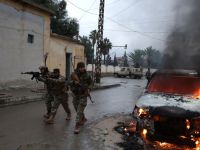Jordan is determined to show that its economic reform program and development projects are on track and carve a niche for itself at the world's most high-profile economic gathering to start in Davos, Switzerland, on Thursday.
After King Abdullah's participation in last year's meeting of the World Economic Forum came to be generally regarded as Jordan's grand entry in the top-flight arena of political and business leaders, Prime Minister Ali Abul Ragheb will carry the flag at this year's summit.
The delegation to the six-day forum is slated to include Deputy Prime Minister and Minister of Economic Affairs Mohammad Halaiqa, Telecommunications and Post Minister Fawwaz Zu'bi, Tourism Minister Akel Biltaji, the head of the Royal Court's Economic Unit, Bassem Awadallah, and a handful of business leaders.
A “Jordan Lunch” scheduled for Saturday, the second day of the forum, will feature an address by the prime minister offering an overview of the progress on the economic reform program, the creation of a duty-free area in Aqaba, private-public sector partnership, and new policies for fiscal monitoring.
The government is currently selecting an international bank or financial conglomerate to manage the fund, which will “invest in key-development projects in the Kingdom, most notably Aqaba, the development of Abdali and the development of Zarqa,” Halaiqa told the Jordan Times. “We will be seeking to maintain Jordan's high profile in the world investment map,” Halaiqa said.
Awadallah said the Jordanian delegation to the Davos' summit will tell participants, including top representatives from the International Monetary Fund, the world Bank, multinational giants, as well as heads of state and officials from scores of countries, “that we are doing what we said we would do” in terms of reforms, investment opportunities and liberalization.
Jordan's achievements in 2000, from last January's accession to the World Trade Organization, to this October's signing of the Free Trade Agreement with the US, and the drive to develop the information technology (IT) sector, will feature high on the Jordanian delegates' talks with their counterparts in Davos, Awadallah told the Jordan Times..
Political and business leaders have long appreciated the yearly appointment in Davos for its laid-back atmosphere that allows them to mingle freely and strike deals away from the pressures back in their capitals. This year, some 30 heads of state and government, including Mexico's new president Vicente Fox, Yugoslav President Vojislav Kostunica, Japan's Prime Minister Yoshiro Mori and Palestinian President Yasser Arafat, are among those due to attend. UN Secretary-General Kofi Annan and WTO Director-General Mike Moore are also on the list.
As Saudi Arabia is expected to participate with a full-fledged large delegation, Awadallah said the Jordanian participants will be particularly eager to network with Arab investors, and “explain Jordan's stand on regional energy and gas projects.”
As for telecommunications, Zu'bi said he intended to take advantage of the networking opportunities in Davos to present “what we have achieved in the past 12 months and tell investors what we plan for the next few months.”
“We will see whether we can garner [investors' and world leaders'] support to join us and participate in our projects even faster, now that we feel things need to be moving even at a faster pace,” Zu'bi told the Jordan Times yesterday.
The meeting, this year entitled “Sustaining Growth and Bridging the Divides: A Framework for Our Global Future,” aims to prompt discussion on the direction of the global economy. However, international news agencies said yesterday the Swiss authorities have imposed an official ban on all demonstrations in Davos during the Jan. 25-30 forum, and will screen all trains and vehicles to keep anti-globalization protesters away from the eastern Swiss ski resort.
The US State Department on Friday issued a warning to Americans about possible “disorderly and violent” demonstrations and advised people to “exercise caution and consider deferring travel to Davos.”
Bridging the divide between the haves and the have-nots in the aspects of health, wealth, knowledge, technology and digital know-how will be one of the central themes at this year's WEF meeting. The new wave of Internet technology, biotechnology, corporate responsibility and the integration of art and culture into everyday life also dominate many of the summit's 300 sessions.
Some of the more unusual topics on the program include yoga for the hands, the end of Hollywood, the mystery of pain and `NGOs — ultimate global regulators?', according to a program released by the organizers.
The regional outlooks for Europe and Asia will also come under the spotlight, as well as the future for the US under the new administration of President George W. Bush. — ( Jordan Times )
By Francesca Sawalha
© 2001 Mena Report (www.menareport.com)






